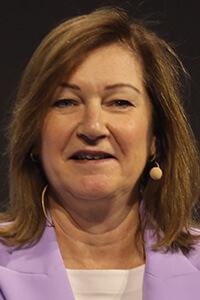
At Convening Leaders 2024, 800 people registered for the session “Unlocking Potential: Strategies for Advancing Women in Business Event Leadership Roles,” where Part One of the study was discussed. The full study is now available. (Whatever Media Group)
The first part of the two-part global study of the “Advancing Women in Business Events Industry” report, released in January by the PCMA Foundation and Business Events Sydney (BESydney), revealed that although women make up 70 percent of the global events industry workforce, they hold less than 20 percent of the industry’s top management or board positions, a figure that lags behind other industries.

Lyn-Lewis Smith
Part Two, released last week, waded into the complicated task of asking questions about why such gender disparities persist when it comes to leadership, including within organizations, the larger business and cultural contexts that surround women, and women’s own perceptions of themselves. The larger challenge “remains the barriers women face based on long-held societal beliefs and practices,” according to the report. “Changes at both the personal and organizational levels will go along way toward remedying these obstacles.”
The report also outlined five suggestions for actions that the global business events industry could take, industry wide, to shift mindsets and effect change. Gender equity in leadership is not a problem unique to the business events industry, “but the steps we can take to shift the dial are,” said Lyn Lewis-Smith, CEO of Business BESydney.
Among the recommendations in the report:
- Establish a steering committee composed of diverse members from different organizations within the global business events industry to develop and disseminate guidelines addressing gender equity within the business events industry.
- Create formal women’s mentorship programs or circles, locally and globally, which are endorsed by business events organizations and headed by senior leaders, rather than relying only on informal mentoring relationships.
- Diversify supplier selection by actively seeking and choosing female-run businesses in procurement processes. Create a guide to women-owned businesses in the industry and encourage the use of these businesses for events.
- Use business events industry expertise to organize in-person and virtual events to create more opportunities for networking outside the industry itself, including events that connect business event professionals with leaders in other industries. Events should include opportunities to make connections, acquire knowledge and skills relevant to career progression, and use social platforms to maintain communication between participants.
- Identify successful models already in operation that are worth replicating. Three such models uncovered in the report’s research include: Women at Amazon, a global affinity group for women, non-binary employees and allies at Amazon.com; the Champions of Change Coalition, a strategy where senior male leaders and women leaders form high-profile coalitions to lead on gender equality issues within their organizations and local, national, and global communities; and MARC (Men Advocating Real Change), created by the global nonprofit Catalyst and designed to help men leverage their positions to advocate for gender equality in the workplace.
The authors of the report emphasize the need to set goals and establish standards for measuring the progress made toward achieving them. To that end, “Advancing Women in the Business Events Industry” research will be conducted every two years to benchmark and track progress, the PCMA Foundation and BESydney announced.
Download and read the full report at convn.org/advancing-women.
Barbara Palmer is deputy editor of Convene.
Related Reading
- Read our story about Part One of the study: Advancing Women Leaders in the Business Events Industry
- Listen to the Part One article on the Convene Podcast,
- What’s Keeping Women Out of the Business Events C-Suite?
- Check out the Convene series interviewing women leaders at convention centers.
- Making Flexible Work Pay Off for Women
